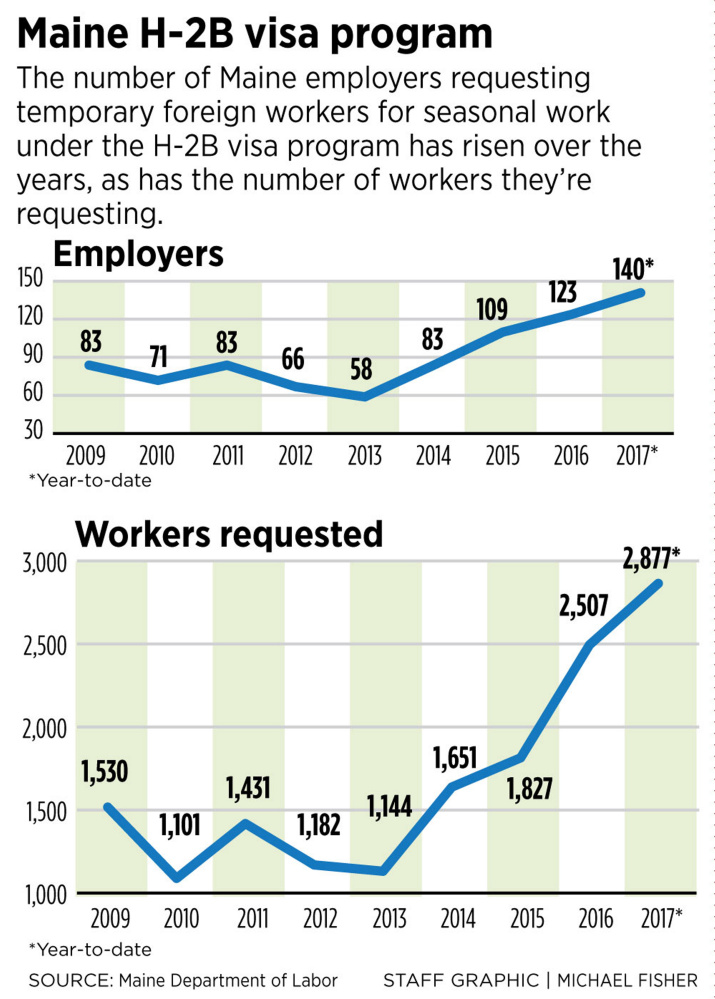In an ordinary year, Julie Van de Graaf would be getting ready to open the Pentagoet Inn, a 16-room bed-and-breakfast and restaurant in Castine.
This year is anything but ordinary, and Van de Graaf is worried.
“It is the end of April, my staff should be arriving May 1, we should be opening the restaurant,” she said. Every year, the inn hires five or six kitchen workers and housekeepers – about a fifth of the staff – from Jamaica with H-2B visas, a tightly regulated seasonal foreign worker program heavily used by Maine’s hospitality sector in the summer tourism season. But because of a new restriction on the program, those workers, some of whom have been coming to work at the Pentagoet for years, haven’t been allowed into the country.
If the program isn’t amended quickly, Van de Graaf expects to lose thousands of dollars in revenue and even worse, tarnish her guests’ experience and overwork her local staff. She’s already had to tell a wedding party she couldn’t accommodate a July date because she isn’t sure she will have enough workers.
“If we are not open, then we are not buying from local farmers, local fishermen, the local bakery,” Van de Graaf said.
“One of the things we realize is that tourism is the engine that drives the economy in Maine. While we are suffering and losing money, it is impacting so many tourist areas in the state.”
The H-2B program allows businesses to hire seasonal foreign workers when they can’t find enough local help to fill jobs. With Maine’s unemployment rate at a historic low, business owners say getting local workers into jobs cleaning rooms and washing dishes is tough.
There is a cap of 66,000 H-2B visas a year in the U.S., but an exemption put in place in 2016 allowed businesses to hire returning workers without affecting the cap.
That exemption expired last year and was not renewed by Congress, just as demand for H-2B visas in Maine is surging. That has left many seasonal businesses, especially hotels, scrambling to find workers.
Maine’s congressional delegation, along with those from other states, is supporting legislation to improve the program and make the returning worker exemption permanent. A continuing resolution that will be under consideration this coming week to keep the government funded could include an extension.
It is still unclear if those efforts will be successful. If they are, help might come too late to relieve short-staffed businesses getting ready for a throng of summer tourists.
“It is really going to hurt operations,” said Raymond Brunyanszki, co-owner of the Camden Harbor Inn and Danforth Inn in Portland. His company expected six workers from the H-2B program this year.
“We are trying to fill some gaps, but it is definitely a very, very difficult year,” Brunyanszki said. “It will in general make Maine look bad and that is not good for a tourism destination.”
HOW H-2B VISAS WORK
Businesses can start recruiting workers for the visas 120 days before the anticipated employment date, so places that open earlier in the season, like some resorts in southern Maine, apply earlier than businesses farther up the coast that open later. This year, visa processing stopped when the cap was hit March 13, leaving applications from many businesses in limbo.
“If you didn’t have a petition date on the very first day, you didn’t stand a chance to get seasonal help,” said Allyson Cavaretta, director of sales and marketing at the Meadowmere Resort in Ogunquit. “It’s sort of like you are proving you are hungry, but there is nothing left to buy at the store.”
The Meadowmere was able to get the 18 workers it applied for this year, Cavaretta said. All but two are returning employees and some have worked at the resort for a decade.
“We made the cap. We are one of the very few businesses that have that luxury this year,” Cavaretta said. “It shouldn’t be a luxury.”
Restrictions on the program are coming at the same time Maine’s demand for H-2B visas is at a nine-year high. As of Thursday, 140 employers had requested 2,877 H-2B workers, roughly 370 more than in 2016 and almost twice the number requested in 2009, according to the Maine Department of Labor.
Conservative critics of the program have said it takes jobs away from Americans who need them, while some liberal politicians and labor unions point to abuses and cases of exploiting foreign workers.
‘OPPOSITION … ISN’T APPLICABLE IN MAINE’
The critique that visa holders are taking jobs from Americans doesn’t line up with reality, said Patrick Morgan, president of Witham Family Hotels. The company owns 13 hotels in Maine, including several in Bar Harbor. It has used H-2B workers in each of its properties for years, and Morgan is holding out hope for legislation to reinstate the returning worker exemption so the company can find enough workers to fill its housekeeping ranks.
“The part that is frustrating is the argument against it is that these jobs are available to able-bodied American workers,” Morgan said. “It simply isn’t the case. Opposition to the issue just isn’t applicable in Maine.”
Seasonal foreign workers also bolster the business during the important shoulder season in September and October, when seasonal employees from high school and college have left, Morgan said.
In order to qualify for a visa, businesses have to prove they tried to hire locally. If there are no local hires, businesses can then go through the expensive and time-consuming visa process. It costs between $1,500 and $2,000 per H-B2 worker with the help of an agency, said Greg Dugal, director of government affairs for the Maine Innkeepers Association. That doesn’t include the cost of airfare and housing for workers when they arrive. Visa workers are paid a prevailing wage set by the U.S. Department of Labor, which means they cannot be paid less than local hires.
“Most people would rather hire someone from around here. If they don’t exist, you have to go this route,” Dugal said.
Van de Graaf, from Castine, puts it in starker terms.
“Why in the world as this tiny little business would I pay out $15,000 to get employees if I didn’t have to?” she said.
LOCAL LABOR FORCE LIMITED
Many coastal employers find it hard to hire locally for seasonal jobs either because the workforce just isn’t there, or potential hires are looking for full-time employment.
But there is a geographic obstacle, too. Many of the seasonal positions are in areas far away from a potential labor pool, said Julie Rabinowitz of the Maine Department of Labor.
“Someone who lives in Millinockett year-round is not going to commute to Mount Desert Island. It is not a reasonable expectation,” she said. The department is encouraging employers and local business groups to think outside the box and come up with transportation and housing programs that could connect Maine workers with seasonal employment.
The hospitality industry is competing with employers who are offering year-round jobs. Maine just broke a record for private sector employment and the state’s unemployment rate is only 3 percent, the lowest in 40 years.
“All these year-round jobs have grown, they are pulling people who might have had a part-time job in the winter and a full-time job in the summer,” Rabinowitz said. Even when jobs are scarce, foreign workers from the H-2B program and J1 student visa program meet a critical need, she added.
“There are certain jobs in the hospitality industry that are always going to be hard to fill,” Rabinowitz said.
The problems with H-2B visas this year are severe, but Maine businesses are used to volatility in the program. Rule changes, holdups in visa approvals, program freezes and other hiccups are commonplace in hiring foreign workers. The returning worker exemption is the “issue du jour,” said Dugal, from the Maine Innkeepers Association. “It isn’t always the same issue with this program, but there is usually an issue,” he said. “In the last 14-15 years this is definitely the worst, the need is greatest and the supply is small.”
It was volatility with H-2B visas that led Bob Smith, owner of the Sebasco Harbor Resort in Phippsburg, to stop using the program several years ago. “We abandoned the program because it wasn’t reliable,” Smith said.
He tried again this year and hired 12 workers from Jamaica. He thought all his workers were lined up, until he learned the returning worker exemption didn’t apply anymore. Now, he expects a stressful summer for his depleted staff and a hectic fall when some seasonal workers leave.
“We spent all this money, put all this effort forward, and in all likelihood, unless something happens soon, it will be a waste because we won’t be able to use them,” Smith said.
Peter McGuire can be contacted at 791-6325 or at:
Send questions/comments to the editors.




